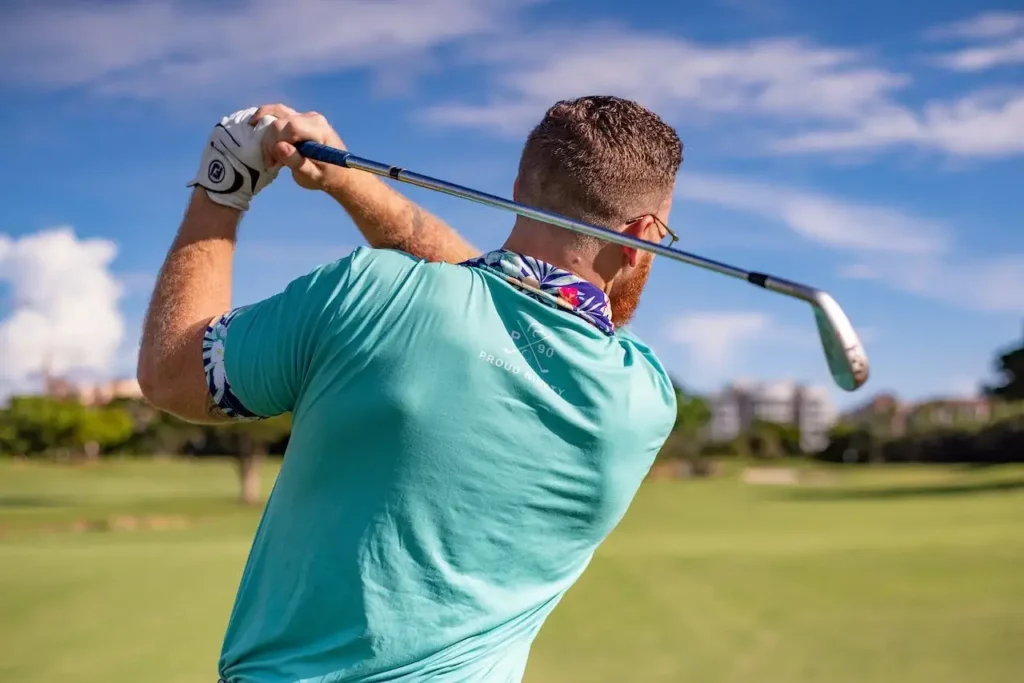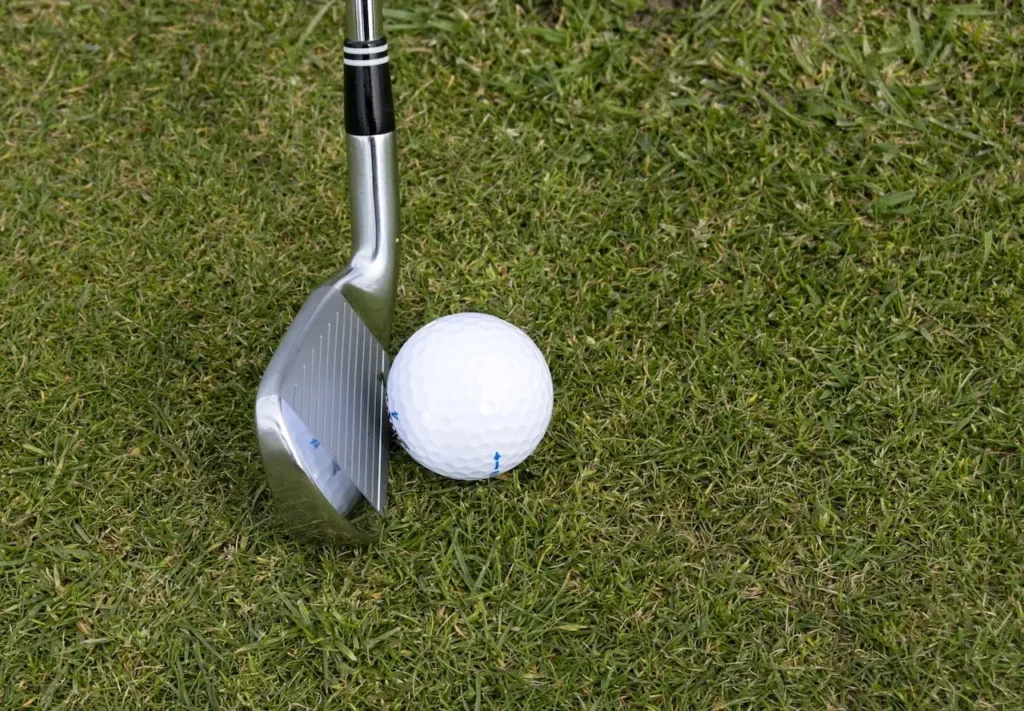This golf betting guide is intended to provide you with unique insights into the world of golf and the critical aspects that might influence tournament outcomes. Whether you are an enthusiastic golf fan or new to golf betting, this guide will provide you with the information and resources you need to make informed selections when placing your bets.

ABOUT GOLF BETTING
Golf betting entails wagering on the results of golf events and individual golfers. Bets on many facets of the game, such as the winner, top finishers, or specific player head-to-head confrontations, can be placed.
Golf has a long history that dates back to the 15th century. Today’s most prestigious professional events draw millions of spectators, both in person and via television and internet coverage.
Golf’s appeal can be ascribed to its unusual blend of skill, strategy, and athleticism.
Why Bet On Golf?
Excitement
Betting on a golf tournament can raise the enthusiasm and engagement of the spectators.
Knowledge
Golf betting allows fans to demonstrate their knowledge and understanding of the game and its participants.
Aspects of Strategy
Golf betting entails taking into account a variety of elements such as player form, course conditions, and odds, which adds a strategic dimension to the viewing experience.
Aspects of Society
Betting on golf with friends or in a group can add a social touch to the game and create camaraderie among fans.
POPULAR GOLF COMPETITIONS
The most popular golf tournaments are:
- The Masters Tournament is an annual men’s golf major championship held in Augusta, Georgia, USA, and is regarded as one of the sport’s most prestigious events.
- The US Open is an annual men’s golf major competition held in the United States that is regarded as one of the most challenging tests of golf in the world, with tight fairways and quick greens.
- The Open Championship (British Open): The oldest of the four major championships in men’s golf, the Open Championship (British Open) is held annually in the United Kingdom, generally on one of many links courses along the coast.
- The PGA Championship is an annual men’s golf major championship hosted by the Professional Golfers’ Association of America. It is one of the sport’s largest events, attracting elite players from around the world.
- The Ryder Cup is a biannual men’s golf competition between European and American teams that takes place over three days and consists of a mix of individual and team matches.
- The Presidents Cup is a biennial men’s golf competition involving teams from the United States and an International team made up of players from outside of Europe, in which the players compete in a combination of individual and team matches over four days.
CONSIDERATIONS FOR GOLF BETTING
Golf is a complicated sport for various reasons. To begin with, it necessitates a high level of technical aptitude, such as the ability to make precise swings and control the direction and speed of the ball. This takes both physical agility and mental attentiveness.
Furthermore, golf is frequently characterized to as a “mental game” because of the importance of a player’s mental attention, strategy, and decision-making. This feature of the game adds a dimension of complexity because players must not only perform technically correct shots, but also make sound decisions on the course.
Weather
Weather has an impact on golf for the following reasons:
- Wind direction and speed can have a considerable impact on a golf stroke, causing the ball to veer from its intended course. A headwind reduces the speed of the ball, a tailwind increases it, and crosswinds force it to move sideways.
- Rain and other forms of precipitation can make the course and balls wet, influencing the trajectory, distance, and spin of the ball. Humidity can also have an impact on the ball’s trajectory by making the air more thick, causing the ball to travel shorter distances.
- Temperature and heat: Extreme temperatures can have an effect on a golfer’s comfort and performance, as well as the distance and trajectory of the ball. High temperatures induce the ball to move further, whereas cold temperatures lead it to travel farther.
- Sunlight and cloud cover: Sunlight can interfere with a golfer’s vision and generate glare, making it harder to see the ball and read greens. Cloud cover can also influence the ball’s flight and how it responds when it hits the ground.
- High altitudes have lower air pressure, which allows the ball to move farther due to less air resistance. The spin and trajectory of the ball can also be affected by altitude.
- Wet circumstances can alter how the ball reacts as it drops on the ground, as well as the friction between the clubface and the ball, resulting in changes in trajectory, distance, and spin.
- Ball flight and trajectory: Weather changes can influence the ball to fly differently, resulting in changes in trajectory, distance, and spin.
- Changes in weather conditions may also influence the type of club a golfer chooses, as well as how they grip the club. For example, a moist grip might induce sliding, whereas a chilly grip can cause the hands to stiffen, impacting the swing.
Terrain
The terrain of a golf course can influence the outcome of a match:
- Terrain type: Different terrain types, such as links, parkland, or desert, can alter the ball’s speed, trajectory, and distance, as well as how it reacts when it lands.
- Conditions of the fairway and rough: The quality and length of the fairway and rough can affect the ball’s trajectory, speed, and distance. A well-kept fairway provides a more predictable surface for a shot, whereas rough or tall grass can slow the ball down and cause it to travel farther.
- Greens: The speed, slope, and undulation of the greens can alter how a ball rolls, influencing the likelihood of making a putt. Faster greens cause the ball to travel further, whereas slower greens lead it to travel less distance.
- Bunkers and water hazards can compel a golfer to change their shot, potentially resulting in a loss of distance or accuracy.
- Hills, valleys, and other elevation changes can all have an impact on the ball’s trajectory, distance, and speed.
- Obstacles such as trees and out-of-bounds regions can all have an affect on a golfer’s shot, causing them to change their trajectory or avoid the barrier entirely.
- Course layout: A golfer’s strategy and shot selection can be influenced by the general design of the course, including the quantity and location of obstacles.
Equipment
Golf equipment can have an impact on a player’s performance. Professional golfers frequently have their equipment customized to their unique needs and preferences, helping them to improve their performance and achieve greater outcomes.
Golf equipment consists of the following items:
- Golf clubs: The kind, length, and weight of a golfer’s clubs can have a considerable impact on trajectory, distance, and accuracy. A golfer’s club selection can also influence how they approach a stroke, such as whether they use a driver for a long shot or a wedge for a short shot around the green.
- Golf balls’ trajectory, distance, and spin can all be affected by the type and condition of the ball. Different varieties of golf balls, such as the Pro V1 or NXT, have different performance characteristics, and the age and usage of a ball can affect its performance over time.
- Grips: The kind and condition of a golfer’s grip, swing, and shot, as well as the comfort of the club in their hand, can all be affected by the type and condition of their grips. A worn or slick grip can cause a golfer to lose control of the club, while a grip that is excessively big or small might interfere with the swing.
- Technology: Professional golfers have access to cutting-edge technology like as GPS trackers, rangefinders, and launch monitors, which allows them to make informed judgments on the course and track their progress over time.
- Clothing, shoes, gloves, caps, and sunglasses can all have an impact on a golfer’s comfort and performance, as well as their protection from the weather.
It is important to note that professional golfers must follow the rules and regulations established by golf organizations, including equipment standards and limitations.
Mental State
The mental side of golf is crucial. Mental toughness, focus, and a positive attitude are required for the game. A golfer’s mental state can have a significant impact on their performance, influencing shot selection, swing mechanics, and overall attitude to the game.
Here’s how your emotional condition affects your golf performance:
- Confidence: A golfer’s degree of confidence can have a significant impact on their performance, impacting shot selection, swing mechanics, and mental approach to the game.
- Focus and concentration: A golfer’s ability to focus and concentrate on the job at hand can have a significant impact on their performance since it lets them to execute shots with precision and consistency.
- Mental toughness: A golfer’s ability to handle pressure and keep cool in high-stress situations can have a significant impact on their performance as well as their ability to recover from mistakes or losses on the course.
- A good attitude and outlook can improve a golfer’s play by giving them the mental fortitude to persevere through difficult holes or situations.
- Past experiences, both favorable and negative, can have an impact on a golfer’s mental state, impacting confidence, focus, and outlook.
- Goal-setting: Setting and working toward attainable goals on the course can offer a golfer with motivation, direction, and a feeling of purpose.
- Self-talk: A golfer’s internal dialogue and self-talk can have a significant impact on their play and mental condition, especially if the self-talk is negative and self-defeating.
- Visualization: Visualizing shots and successful outcomes can help a golfer mentally prepare, gain confidence, and execute shots more precisely.
Course Setup
The following factors influence the outcomes of golf matches:
- The length and layout of a course can have a significant impact on a golfer’s performance as well as the strategy they employ during play. Longer courses may necessitate more endurance and power, whilst more difficult or steep courses may necessitate greater accuracy and elegance.
- Hole design: The design of each hole can have a significant impact on how a golfer plays, such as the type of shots required, dangers to avoid, and optimum landing spots.
- Green design and speed: The slope and undulation of greens, as well as their speed, can have a significant impact on a golfer’s ability to make putts and score well.
- Fairway conditions: Fairway conditions, including as rough, bunkers, and other hazards, can influence a golfer’s shot selection and trajectory.
- Tee boxes: The placement of the tee boxes influences the length and difficulty of each course, as well as how a player approaches each shot.
- Weather variables, like as wind, temperature, and precipitation, can have a significant impact on how a course plays and how a golfer approaches each shot.
- Local laws and regulations, such as preferred lies or bunkers, can influence how a golfer approaches each shot as well as their overall strategy throughout play.
- Course maintenance: The degree of course maintenance, which includes fairway, rough, and green conditions, can have a significant impact on how a course plays and how a golfer approaches each shot.
Experience
Experience is a major factor in which golfers go on to win tournaments, and it is crucial to recognize that peak performance varies widely amongst players. Some golfers may continue to compete at a high level well into their forties or fifties.
Take a look at the following:
- Experience can aid in the development and refinement of a golfer’s talents, including their swing, short game, and mental approach to the game.
- Course knowledge: The more time a golfer spends on a course, the better they understand the layout, architecture, and conditions, which can have a significant impact on their performance and strategy during play.
- Shot selection: Based on their grasp of the course, their own skills, and the situations they are experiencing, experience can assist a golfer make better shot decisions.
- Mental preparation: Experience can help a golfer mentally prepare for the game, such as how to handle pressure, retain focus, and remain positive in difficult situations.
- Adaptability: A golfer’s experience can assist them adapt to changes in course conditions, weather, and other things that may affect their play.
- Confidence: As a golfer gets expertise, his or her confidence grows, which leads to better stroke execution and performance.
- Awareness of strengths and weaknesses: As a golfer gains expertise, he or she will have a greater awareness of his or her own strengths and shortcomings, allowing them to make modifications and improvements to their game.

GOLF BETTING MARKETS
Golf betting markets that are popular include:
- Betting on the golfer to win the tournament outright.
- Top 5/10/20 Finish: Betting on a golfer to finish in the tournament’s top 5, 10, or 20.
- Head-to-Head: Betting on one golfer to defeat another in a certain tournament.
- Betting on which golfer in a specific group would do the best in a tournament is known as group betting.
- Top Nationality/Continent: Betting on which country or continent will have the most golfers finish in the top three of a tournament.
- First Round Leader: Betting on which golfer will lead the competition after the first round.
- Betting on whether or not a golfer will make a hole-in-one during the competition.
- Top Amateur: Betting on which amateur golfer will have the best performance in the competition.
- 72 Hole Match Bet: Betting on one golfer to beat another player in total strokes over the course of 72 holes.
- To Make the Cut: Betting on a golfer’s ability to make the cut and continue playing in the tournament after the first two rounds.
BEST SITES FOR GOLF STATS
The following websites are the best sources of free golf statistics:
You can learn more about these golf stats sites here: Best Sites For Free Golf Statistics
GOLF FAQ
What exactly is golf?
Golf is a club-and-ball sport in which competitors strike balls into a succession of holes on a course with as few strokes as possible. Athletes compete for prize money and earn a living via the sport of professional golf. These athletes may compete in a variety of professional golf tours and tournaments, including the PGA Tour, European Tour, and others.
What does the term ‘handicap’ in golf mean?
In golf, a handicap is a numerical assessment of a player’s ability that is used to level the playing field in tournaments and track a player’s progress.
In golf, what is the difference between a bogey and a birdie?
A bogie is one stroke higher than par for a hole, whereas a birdie is one stroke lower. Par is the number of strokes that a skilled golfer should take to accomplish a hole or a game of golf.
What is a golf caddy’s function in professional golf?
A golf caddy is someone who carries a golfer’s clubs and assists them during a round of golf. Caddies play a significant role in professional golf, assisting golfers with club selection, reading greens, and making other critical decisions throughout a competition.














[…] out the following extensive golf statistics websites. These websites are go-to sources for all your golf information needs, with accurate and up-to-date […]